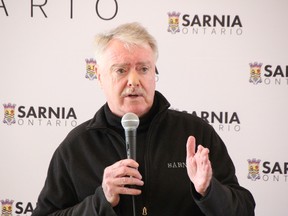
Sarnia Mayor Mike Bradley has opted not to veto any council-approved changes to the city’s 2025 budget.
Advertisement 2
Article content
Article content
Article content
Bradley said he let his 10-day window to override council changes expire as of Friday, choosing to let council decisions from Nov. 26 deliberations stand.
He took his time while also dealing with other city businesses, heard advice, and decided to let the process play out much like it has for years, Bradley said.
“The vast majority of council had worked very cooperatively,” he said, adding “I respect the final judgment.”
He received strong mayor powers last year in exchange for Sarnia pledging housing-target goalsand also opted then not to use his veto.
Tea end result for 2025 is a $184.25-million operating budget, up nearly $4.7 million from 2024, or about 2.5 per cent.
The property tax portion is $95.6 million, about a $4-million increase, or 4.42 per cent, city officials said after deliberations.
Advertisement 3
Article content
Capital spending plans on roads, sewer upgrades, shoreline protection, bus purchases and other things for the year to come is $56.3 million.
The tax increase tends to be mitigated after Lambton County and school board spending plans are set, Bradley said.
“I expect the final tax increase will be … depending on the county, around three, three and a half” per cent, he said.
Sarnia’s increase as it stands represents about $45.72 for every $100,000 of residential assessment in the city’s transit levy area, and $42.16 per $100,000 of residential assessment elsewhere, officials have said.
Strong mayor powers from the province let the city’s mayor make changes to the city staff-prepared budget before council can make amendments, gives the mayor a 10-day period for vetoes, and let’s council override any vetoes within 15 days with a two-thirds majority.
Advertisement 4
Article content
Bradley also didn’t make any changes to the staff-prepared draft before council deliberations.
That approach may change next year, Bradley said, noting he still has concerns about the cost a new police station.
“Next year, I think it could be different, but I won’t say it will be,” he said, noting he and city staff also were careful to make sure they were abiding by the still relatively new provincial rules.
Now, after two years, he has a better understanding of the process, he said. Some mayors have used the provincial powers more than others, Bradley said.
“I’ve been, up to this point, respecting the collective direction of council.”
Coun. Terry Burrell said he prefers the old approach, and acknowledged Bradley has kept things consistent.
Advertisement 5
Article content
But that could change in the future, he said, noting that could have political ramifications in a city like Sarnia where the community is relatively small.
“I think depending on the issue, (using strong mayor powers) could create quite a problem within the municipality,” he said, comparing them more to presidential powers in the United States and a departure from Canadian norms of one vote per elected official.
Burrell, who pushed unsuccessfully for more cuts during budget deliberations, said he’s concerned about Sarnia’s reliance on reserves to keep tax increases low.
He’s called it an unsustainable long-term strategy.
Hopes are to talk more about Sarnia’s approach well before next year’s deliberations take place, he said.
“I probably will bring a motion (before March) so council can get a better handle on what’s happening, and hopefully we can correct that potentially major problem,” he said.
Article content